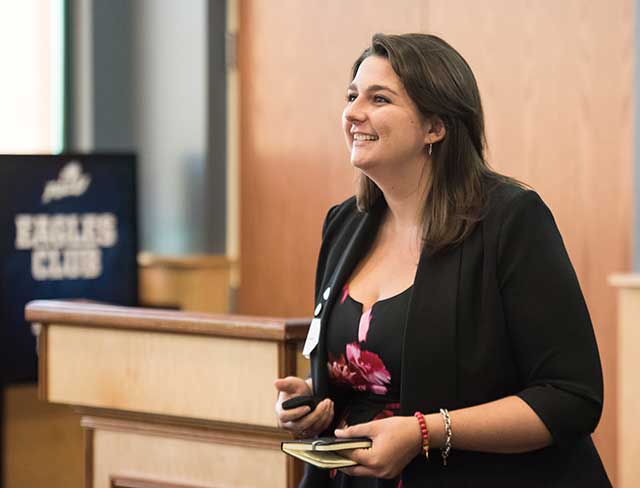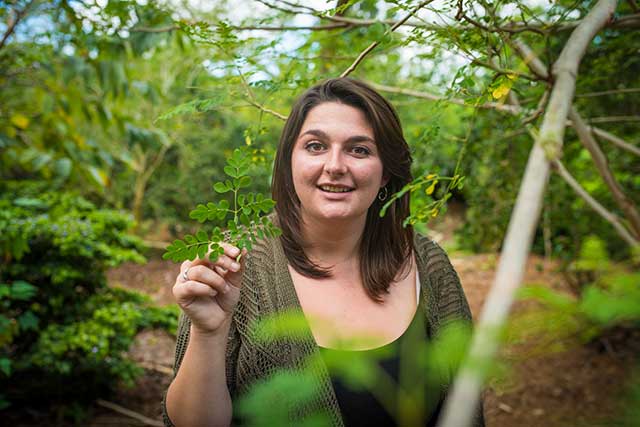Lori Boegershausen was one of two graduating seniors chosen to speak at the FGCU Board of Trustees meeting Tuesday, April 19 as part of a student success showcase. In addition to several FGCU honors, she has been awarded a Fulbright grant to teach in Germany for a year and then plans to attend graduate school. Following are her remarks from the BOT presentation, edited for FGCU360.
I would like to extend my gratitude to all who have facilitated my time and successes at Florida Gulf Coast University. I have become Student of the Year for the College of Arts and Sciences, a Hall of Fame inductee, and one of FGCU’s first Fulbright scholars, and I greatly owe this honor to the administrators, faculty, and the atmosphere of this university. In particular I am in debt to Drs. Nicola Foote, Melodie Eichbauer, Eric Strahorn, Sean Kelly, my Honors peer mentor James Till, Jessica Rhea and various philosophy professors who have taken me under their wings this past year.
My time within the liberal arts program here has granted me the transformative skills that I needed to be in the position I am in. Through exploration of the humanities, we learn how to think creatively and critically, to reason, and to ask questions. It is with this knowledge that I have been granted a Fulbright to Germany, a National Fellowship, and was accepted to graduate school at Ohio University.
As a first-generation college student, my parents were infuriated by the fact I had chosen history as my major, as well as German and early and medieval modern studies as my minors. With the common question, “How do you plan to make money with that degree?” However, I promised that these fields would transform me and bestow skills that I never knew I needed.

This journey began directly as I entered my major field. I took an Honors Program course entitled “The Integrated Core of Global Curriculum.” A course, as a sophomore, where I read, analyzed, and discussed 32 texts over the course of one semester with seven other students. These books included works from Aristotle, Adam Smith, Shakespeare, and more. The cultural capital I gained in this class is one that I could not have achieved if I attended another university. My time in this course with dedicated students and an enriching faculty member pushed me to do more. I was lucky enough to serve as a teaching assistant for this course my senior year, where I have been witness to the same mental transformation of undergraduates that I was accustomed too.
Not only did my critical thinking grow, but my desire to become engaged culturally was sparked. Through the German minor, classmates and I applied for a grant from the German Embassy that allowed us to organize a week of events on campus to show how Germany is a leader within the European Union.
Not only did I become engaged with the German Embassy, but I also received the opportunity through FGCU’s Center for Judaic, Holocaust, and Genocide Studies to organize a speaker series that brought 10 world-renowned scholars to FGCU to speak about their research. After this success, I was able to collaborate and organize an International Holocaust in Hungary Conference, with 70 mostly international speakers, to come here to FGCU. I continued to bring research alive. In my senior year, I translated a Gestapo interrogation for Dr. Paul Bartroprom German to English. This was the first time in history this document had been translated.
If it were not for the history faculty here at FGCU, I would not be engaged whatsoever. However, they saw my passion and they fostered it. Each professor I encountered in the program invested their time in me and saw potential. Since my freshman year, I have presented at nine conferences. I can confidently say that I have moved from a history student to a historian because of their focus on research and their ability to mentor. I was able to create primary source documents on women in Southwest Florida, a project that won a Community Engagement Day award; to translate book titles within the FGCU Library archives; complete several community-based oral history projects; analyze the social, political, and economic variances in society that have created platforms for problems throughout history.
This research culminated in a national internship at George Washington’s Mount Vernon, a highly selective program where I was selected out of thousands to be a public historian, work in the education center, museum, while receiving access to the Fred W. Smith National Library. It was my work here that won the best paper and presentation for the National History Honor Society in the state of Florida.

However, I attempted to embody the mission of Florida Gulf Coast further by working on international issues and sustainability. I interned for a Honduran orphanage on allocating educational materials in their native dialect and organized fundraising. I attended sustainable policy and organizing conferences in Virginia and Georgia, while accessing the Food Forest as a tool to deeply understand permaculture as an innovative aspect for international development. I became a member of a national standards council for food certifications. I have worked in lower-income communities on community garden projects to alleviate food insecurities and spread nutritional education.
It was the enriching understanding of history and FGCU’s mission of community engagement that foreshadowed my calling. In the future, I wish to work for an NGO on sustainability and educational development. It is with this notion that I applied for a Fulbright.
In my coming year as a Fulbright fellow, I will be working in the state of Niedersachsen in Germany teaching English using transcendentalism, while also engaging the students in a dialogue on sustainable development and technology, with the hopes of also working with officials on policy formation.
None of this would have been possible without my time at FGCU. The history department and all of the humanities faculty here — but especially Drs. Foote, Eichbauer and Strahorn — believed in me even when I did not. They saw FGCU transform me before I could even reflect upon it myself.
I leave with a quote from Edward Said, “They cannot represent themselves, they must be represented.” I have studied to be a voice for others and to create change for the future. I believe I can do so now. FGCU has altered me and I am elated to be a change agent in the world as I carry on its mission. I have felt The FGCU Effect.